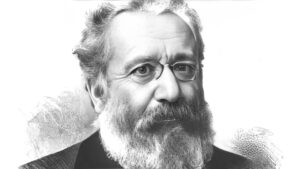Written by Michaela Sujancova

Jan Neruda is one of the greatest literary figures of the second half of the 19th century. He was born on 9 July, 1834 in Prague in the Mala Strana district and died on 22 August 1891. His house with the name U Dvou sluncu can be found in Prague in Neruda Street which was named in his honor. Neruda devoted his life to literary and journalistic work. He became a well-known Czech poet, journalist, writer, and art critic, also he represented an important role as a member of the May School. Unfortunately, he was not recognized until twenty years after his death.
After graduation from Academic Grammar School, he went to university but did not finish his studies of law and philosophy. Eventually, he decided to pursue his literary career. Neruda was a remarkable journalist because of his perceptiveness, talent for capturing the essence of a problem, and the way he used satirical humor. During his life, he contributed to different literary magazines and newspapers like Cas, Hlas, Obrazy zivota, Kvety, Lumir, or Narodni listy for which he had worked for the rest of his life. He composed more than 2000 manuscripts and they cover many different topics. Some of them deal with his experiences from travels to, for example, France, Egypt, Italy, or Greece. Interestingly, he used as a signature a small triangle (Δ) or one of many pseudonyms.
His outstanding feuilletons are put together in five volumes, and his most famous piece is called Kam s nim. Furthermore, Neruda is also well-known as a poet. His collections of poems, for example, Cosmic songs, Ballads, and Romances or Plain Themes are unique because of his realistic view of the world, simple but direct language, also the effort to show an undistorted image of life and easy intelligibility of their message. As for prose, his work is strongly associated with the place where he grew up, Mala Strana district, as we can see in his book Povidky malostranske.
On a different note, there were a few women that entered his life, although he was never married. His first love was Anna Holinova. Some people called her the eternal bride of Neruda, and he devoted some of his poems to her. Her father introduced him to other famous writers like, for example, Bozena Nemcova or Karel Jaromir Erben. The second important woman that influenced his life was also a writer named Karolina Svetla. They encouraged each other in their literary career and she lent him money more than once. Throughout the following years, he fell in love with two other girls, but there was too big of an age difference. Because of his financial problems and depression, he fell into alcoholism. The last eleven years of his life were marked by various health issues. He suffered from phlebitis, and then he shattered his kneecap. In 1891 Neruda died from bowel cancer. His wish was to be buried in Vysehrad Cemetery where we can find his grave today among other famous and celebrated people.